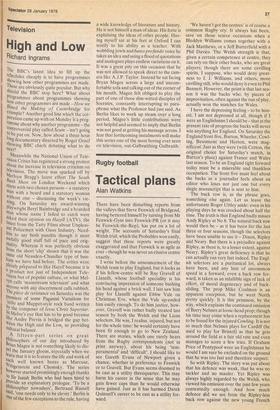Television
High and Low
Richard Ingrams
The BBC's latest idea to fill up the schedules cheaply is to have programmes Showing how other programmes are made. These are obviously quite popular. But why should the BBC stop here? What about Program about programmes showing how other programmes are made —How we filmed the Making of Casterbridge for example? Another good line which the corporation came up with on Monday is a programme about why another programme — the controversial play called Scum — isn't going io be put on. Now, how about a three hour long documentary directed by Roger Graef Showing BBC chiefs debating what to do next?
Meanwhile the National Union of Television Critics has registered a strong protest about the increase in television criticism on television. The move was sparked off by Nierlvyn Bragg's latest effort The South kink Show on London Weekend which starts with two chosen persons — a statutory Inall with a beard and a statutory woman Without one — discussing the week's viewing. On Saturday my award-winning Playwright Beryl Bainbridge and a bearded Riau whose name I failed to catch were asked their opinion on Hazen (ATV), the latest from the Tatty Films about Unpleasant Policemen with Guns Industry. Needless to say both pundits though it most awfully good stuff full of pace and orig1,11ality. Whereas it was perfectly obvious irom the short 'clip' shown that it was the s, ame old Neasden—Chandler type of bun'lam we have had before. The critics were Plainly prepared to like Haze// because it is a, Product not just of Independent Television but of popular culture, or what MelvYll calls 'mainstream television' and what tnYone with any discernment calls rubbish. 'Re piece de resistance on Saturday was the Premiere of some Paganini Variations for cello and Muppet-style rock band written
the composer of Jesus Christ Superstar, Melve's eye that has to be good because like Andre Previn it bridged the gap between the High and the Low., so providing cultural balance.
A fifteen-part series on great Philosophers of our day introduced by Rrian Magee is not something likely to disPO the January gloom, especially when we learn that it is to feature the life and work of 8,11ch well known bores as Marcuse,
Nittgenstein and Chomsky. The series
h°vvever started promisingly enough thanks to Sir Isaiah Berlin who had been hired to Provide an explanatory prologue. `To be a Philosopher nowadays', Bertrand Russell said, 'one needs only to be clever.' Berlin is 00e of the few exceptions to the rule, having
a wide knowledge of literature and history. He is not himself a man of ideas. His forte is explaining the ideas of other people. Having myself sat at his feet at Oxford I can testify to his ability as a teacher. With wobbling jowls and basso profundo voice he takes an idea and using a flood of quotations and analogues plays endless variations on it. It was a great pity on this occasion that he was not allowed to speak direct to the camera like A.J.P. Taylor. Instead he sat facing Bryan Magee across a large and uncomfortable sofa and talking out of the corner of his mouth. Magee felt obliged to play the part of one of those dim-witted disciples of Socrates, constantly interrupting to paraphrase what the Professor had just said. As Berlin likes to work up steam over a long period, Magee's little contributions were not helpful and seemed to imply that Berlin was not good at getting his message across. I fear that forthcoming instalments will make this series one of the most boring ever seen on television, out-Galbraithing Galbraith.


































 Previous page
Previous page